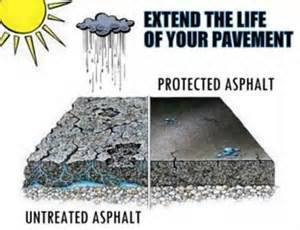All Seal Coating Is Not Made Equal
Pavement consists of asphalt binder (the “glue”) and aggregate (the stone). Without the binder, only brittle stone remains with nothing to hold it together. Unfortunately, asphalt pavement is not like concrete, which “gets stronger over time”… asphalt in fact gets weaker over time because the binder oxidizes out due to exposure to air, UV rays and water. The solution is to “seal” the surface to trap the asphalt binder inside.
While most contractors use asphalt emulsion sealers, which are proven to be less-durable, M&M uses only polymer-modified refined coal tar sealer. These two product types are intrinsically different from one another, with refined coal tar exhibiting advantages above and beyond its competitor with regard to molecular self-cohesion, plasticity, and durability. Asphalt emulsions are suitable for residential driveways or lower traffic areas, but for superior longevity refined coal tar has proven to be the winner, which is why we use it on every job.

- Reduce oxidation of asphalt binder; keep pavement strong
- Prevent water from infiltrating the surface pores
- Protect against harmful UV rays, gasoline and oil spills
- Enhance aesthetics and create contrast for parking lines
- Double the service life of the pavement structure

Common Seal Coating Myths
All sealer is the same (wrong)
The more often I seal it, the better (wrong)
Sealer will fix the cracks (wrong)
I should seal it right after it was paved (wrong)
This goes completely against the industry’s best practice, which advises waiting at least 1 year after installation to seal pavement
Sealing is for appearance only; it offers no preservation value (wrong)
A CALL BACK
